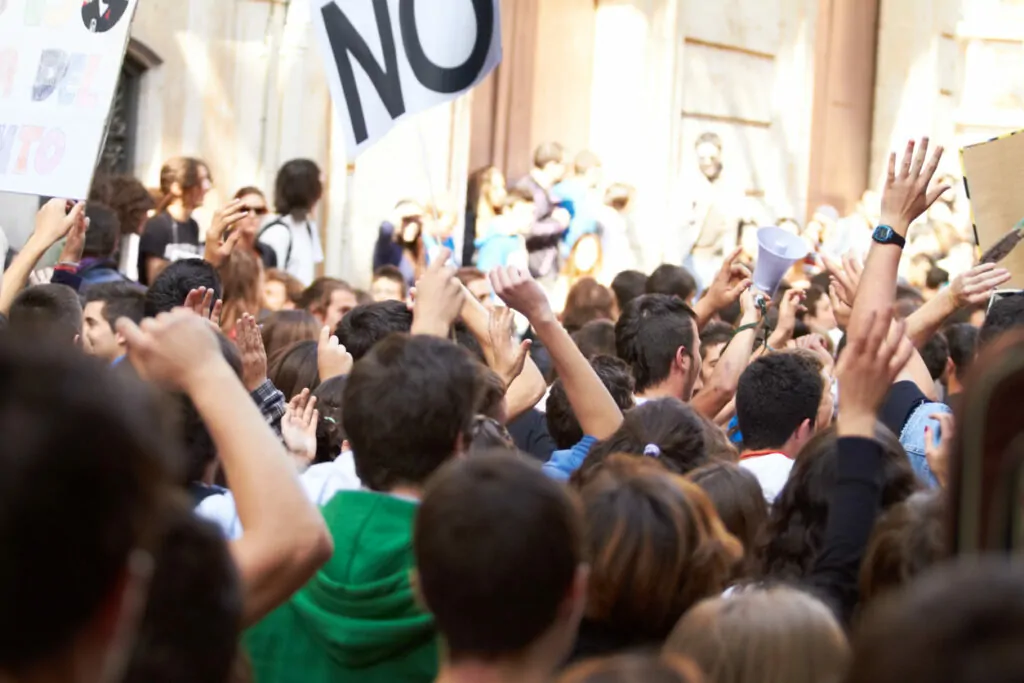As governments fail to act, campaigners, activists and concerned citizens have increasingly taken to the streets to raise awareness about climate change, the treatment of minorities and women by the police, and draconian immigration policy.
Rather than addressing the concerns raised, the government has instead imposed greater restrictions on the right to protest. After numerous defeats in the House of Lords, the controversial Police, Crime, Sentencing and Courts Act 2022 (the Act) finally came into force on 12 May 2022, although not all provisions are currently in force (see table for more information).
The House of Lords initially described this as ‘draconian and anti-democratic’ but after some concessions were secured, the Bill was finally approved. On the contentious issues of noise levels, the government agreed the Home Office would review the powers within two years, to see if the ‘too noisy’ provision has worked.
What are the government’s objectives with these amendments and what practical impact do they have?
The government has stated that the Act is designed to:
- Widen the range of conditions that the police can impose on public assemblies to match existing police powers to impose conditions on public processions. These include start and finish times and maximum noise levels.
- Broaden the range of circumstances in which police may impose conditions on a protest, including a single person protest, if it is believed serious disruption will be caused to an organisation. The decision to place conditions on an assembly is an operational matter for the police. Clarity on the meaning of ‘serious disruption’ will be defined by the Home Secretary in secondary legislation once debated in parliament.
- Increase the maximum penalties for wilful obstruction of a highway (even when it is closed by the police) from a £1,000 fine to an unlimited fine and/or six months’ imprisonment.
- Limit the requirement relating to a breach of conditions to ‘knowing or ought to have known’ that the condition has been imposed (to supposedly avoid the ‘loophole’ that protestors can wilfully pretend not to hear the conditions).
- Restate the common law offence of public nuisance in statute and abolish the common law offence to supposedly provide clarity to the police and potential offenders, giving clear notice of what conduct is forbidden. The maximum penalty for this offence is reduced from an unlimited term, to ten years’ imprisonment, although any protesters found guilty of public nuisance are likely to face penalties in line with existing sentences for public order offences.
The government has stated it has listened to concerns about restrictions on freedom of speech and freedom of assembly and believes that these measures are proportionate, and take into account the rights of protestors and the rights of those impacted by the protest. When using these, or existing public order powers, the police must act within the law and be able to demonstrate that their use of powers are necessary and proportionate. They must act compatibly with human rights, principally in relation to protests, Article 9 (freedom of thought, conscience and religion), Article 10 (freedom of expression) and Article 11 (freedom of association) of the European Convention on Human Rights (ECHR).
A chilling effect on the right to protest and freedom of speech?
The right to peacefully protest, along with a free and independent media and legislature is fundamental to a functioning democracy. It has always been the case that the police are required to balance the rights of protestors to the rights of those impacted by them whilst protests are happening and in a fluid situation. The police have faced recent criticism both for allowing protests to continue when daily activities have been disrupted, and for heavy handed policing at peaceful protests. The mainstream publicity surrounding this new Act has largely focused on the rights of those impacted by the protests, and less so on the right to peacefully protest. Due to political pressure, the risk is that decisions made on the ground will be skewed towards those who are impacted by the protest, and not those exercising their right to protest.
The new legislation also puts the fear of arrest on those organising protests/demonstrations, and those attending, given that the conditions imposed can be so broad, and easily and unintentionally breached when in a fluid dynamic situation such as a demonstration. Many of the organisers feel a duty of care towards those supporting their cause and do not want them to face the risk of arrest. The police have to make snap decisions on the ground. It is likely that some will be deterred from arranging protests and some deterred from attending with the potential chilling effect on the right to protest and freedom of speech.
Kate Goold, partner in our Crime, Fraud and Regulatory team, comments:
Many campaigners and concerned citizens want to express their views without risk of arrest, potential imprisonment or draconian conditions which cause such a restriction to a protest that it almost neutralises the impact. The new Act places greater powers on the police on the ground to determine factors such as noise level before allowing a protest to continue. The arbitrary way in which the police appear to have policed the Sarah Everard vigil and BLM protests compared to other protests, not to mention their bizarre approach to Covid-19 breaches in Downing Street, raises concerns that the balance will be struck too far on the side of those impacted by the protest than on those exercising their democratic rights.
Our Crime, Fraud and Regulatory team can offer expert advice in relation to the topics discussed in this article. If you require advice, please get in touch here.
